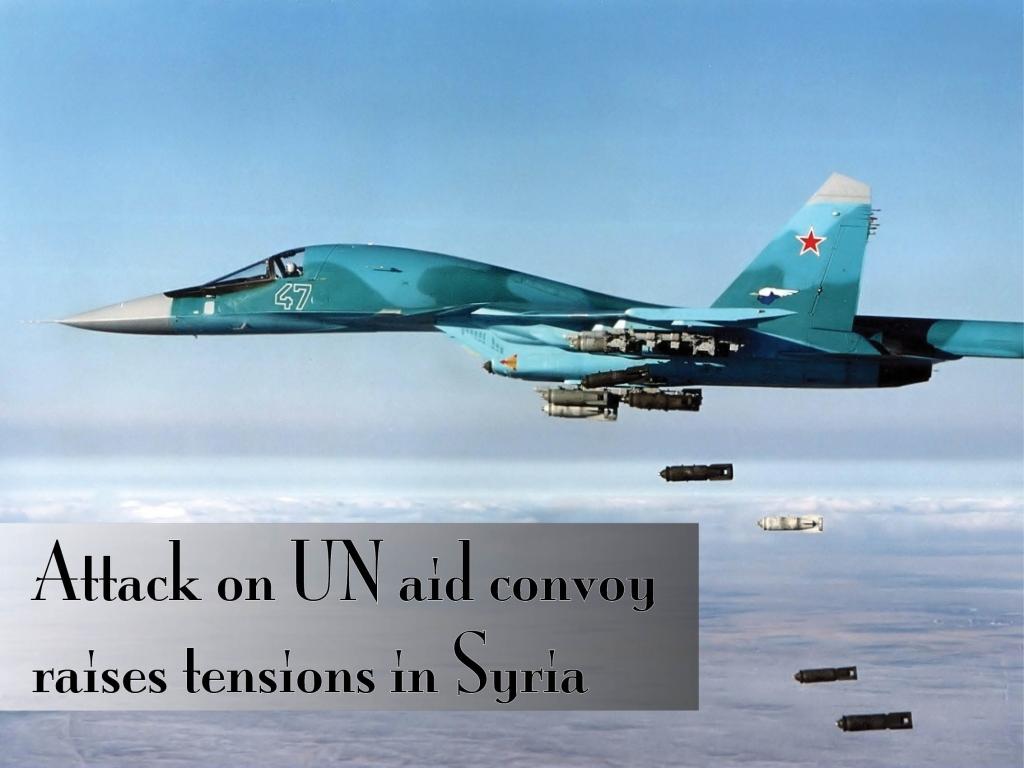In the Syrian civil war where men and women die in the hundreds, the recent bombing of a UN aid convoy and a Syrian Arab Red Crescent (SARC) warehouse on Sept. 19, which led to the deaths of around 20 people, has added to the growing tally of deaths and injuries. Responsibility for the attack has been denied by both the US, which is in support of the Syrian rebels, and Russia, which is in allegiance with the Syrian government. Following the attacks, the Sept. 12 ceasefire and truce between the two nations has since been nullified.
Syria has been locked in a constant conflict since 2011 when rebellious factions opposed President Bashar al-Assad in protests and demonstrations, which kindled the anti-Assad sentiment into a full-scale civil war. From its onset, the Russian Federation was in support of President al-Assad, and authorized a military intervention in Syria on Sept. 30, 2015, and has been conducting airstrikes against both anti-Assad rebels and the Islamic State of Iraq and the Levant (ISIL). The US, with support from the UN, has been backing the rebel fighters, and has most prominently armed and trained Kurdish fighters who oppose al-Assad.
According to the UN, the convoy, which consisted of 31 trucks loaded with relief materials, was attacked near a SARC warehouse in Urum al-Kubra, just outside of Aleppo. Witnesses reported raging fires and constant explosions, which lasted for around three hours. During that time, 18 of the trucks were destroyed and around 20 civilians were killed.
“The elusiveness of this attack is what makes it so deadly to international politics,” said Paul Namkoong (12), former AP World History student. “Because nobody knows who did it and since there is no evidence indicating either party, their politicians not their soldiers have to fight it out, and therefore could weaken negotiations between the US and the Syrian rebels and Russia and the Syrian government.”
In the aftermath of the incident, those responsible for the attacks have yet to be identified, with both the US and Russia throwing accusations at each other. The US claims that the attack had to be an airstrike—as evidenced by the craters characteristic of an aerial strike around the trucks—which would have been conducted by either the Russian Aerospace Force or the Syrian Arab Air Force. The US also reported that a pair of Soviet built Sukhoi Su-24s were circling the area and that the attack was too precise to have been conducted by the Syrian air force.
Russia, on the other hand, denied these allegations and maintained that the strike was sanctioned by the US. According to Major General Igor Konashenkov, a US predator drone, armed with air-to-ground missiles, was responsible for the attack on the convoy, a notion that the US Air Force was also quick in denying. However, conclusive evidence in support of either proposition is yet to be found.
“I think the international community’s response to the bombing was disappointing but ultimately understandable,” said Silber, social studies teacher. “Mere condemnation is only empty words. Sanctions should be taken against Russia, but the problem is that there already exist sanctions on Russia. There was also muted response from the international community, especially since there exists no will on the part of the Americans or the Western Europeans to take decisive action against the Russians. Even then, we won’t see a resolution to this issue until a compromise is made between Russia and the United States, which would likely involve al-Assad staying in power.”
On Sept. 12, the US and Russia negotiated a ceasefire in Syria which, if maintained for one week, allowed US and Russia to conduct joint airstrikes against ISIL and al-Nusra, or al-Qaeda in Syria, forces. But with the recent attacks on the UN convoy, coupled with a Sept. 17 attack conducted by US-led coalition forces where a pair of F-16 and A-10 aircrafts unintentionally killed 62 Syrian government soldiers, the Syrian government officially declared the ceasefire over.
“In the status quo, nobody stepped in to claim responsibility of the attack, which only perpetuates the current tug-of-war happening in Syria between the two major belligerent forces and makes the current Syrian issue all the more difficult to tackle,” said Jay Min (12), current MUN member and former AP World History student. “It could have been done by anyone, but nobody will admit to it because that would undermine their own presence in the conflict, and as such, it does not seem like peace in Syria can be established anytime in the near future. Furthermore, the UN took a side when the UN Secretary General Ban Ki Moon recently made a statement that basically blamed al-Assad’s Air Force for the airstrike, which it should never do without sufficient evidence. As such, all parties are adding controversy to an already controversial issue.”

